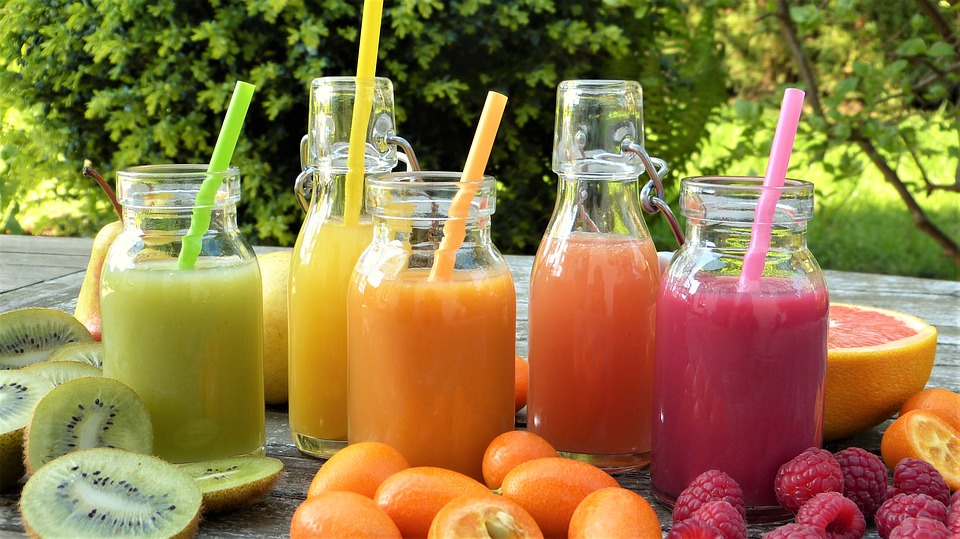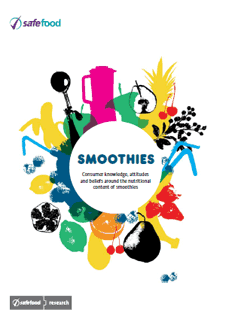Consumer knowledge, attitudes and beliefs around the nutritional content of smoothies

Downloads
Dietary guidelines recommend that we eat five or more portions of fruit and vegetables every day, and consumers are increasingly using smoothies as a way to achieve this.
 Smoothies have a ‘healthy image’ which may not always be justified. They provide a convenient way of consuming fruit and, where yoghurt and milk are included, contribute to dairy intake. But there is a concern that many commercially available smoothies are high in calories and added sugars. Some smoothies are made with syrup-based fruit concentrate rather than fruit which results in a product higher in sugar and lower in vitamins, particularly vitamin C. In addition, many have sugar added in the form of sucrose, syrup and honey.
Smoothies have a ‘healthy image’ which may not always be justified. They provide a convenient way of consuming fruit and, where yoghurt and milk are included, contribute to dairy intake. But there is a concern that many commercially available smoothies are high in calories and added sugars. Some smoothies are made with syrup-based fruit concentrate rather than fruit which results in a product higher in sugar and lower in vitamins, particularly vitamin C. In addition, many have sugar added in the form of sucrose, syrup and honey.
The Health Promotion Agency in Northern Ireland (NI) and the Department of Health and Children in ROI currently advise that smoothies count as one portion of fruit. A warning about the potential harm to teeth associated with the frequent consumption of fruit smoothies due to their sugar and acid content was issued by the British Dental Health Foundation in 2008 (Smith 2008).
If consumers of smoothies are to make informed choices, it is important that they are aware of the varied nutritional composition of smoothies. Amarach Consulting (2007) conducted research into some aspects of smoothie consumption in ROI. However, there is little available information on consumers’ knowledge, attitudes, beliefs and behaviours around smoothies on an all-island basis.
The aim of this research was to investigate consumer knowledge, attitudes and beliefs around the nutritional content of smoothies upon which to base safefood communication about smoothies.

Smoothies are blended drinks consisting of a number of ingredients including fruit (or less commonly vegetables), fruit juice, ice, yoghurt and milk. There are three main types of smoothies: fruit only, fruit and dairy, and functional.
Functional smoothies, such as those that contain probiotics, have appeared only very recently on the market. Smoothies are commonly sold as a drink, snack or meal alternative and are available either ready-made or made-to-order.
Summary and conclusions
- One in three adults on the island of Ireland said they drink smoothies
- Smoothies, were more popular among women, the younger age group and higher social classes
- Those who drank smoothies did so predominantly because they liked the taste, followed by a desire to be healthy in some way, be it to increase their fruit intake or increase their consumption of ‘natural’ foodstuffs
- Non-smoothie drinkers cited lack of interest, a dislike of the consistency of the drink, expense and excessive sweetness as some of the reasons for not drinking smoothies
- Approximately four in ten smoothie drinkers on the island were frequent consumers of smoothies, drinking them at least two to five times a week
- There was a clear preference for pre-packed and home-made smoothies in NI, while in ROI there was a stronger preference for made-to-order smoothies
Smoothies are an increasingly popular way of consuming fruit but guidelines advise that they count as one portion of fruit.
A number of misconceptions concerning smoothies were evidenced:
- Over-expectations as to ‘5-a-day’ contributions. It appeared that the overriding common belief was that they are high in fruit (average four portions) and dairy (average two portions)
- Awareness of smoothie ingredients appeared to be low
- Many perceived smoothies to be low in calories which may or may not be the case depending on the smoothie product purchased.
Smoothie consumers and non-consumers generally perceived smoothies as a healthy food, however, there was also some confusion observed:
- Consumers seemed aware that smoothies were high in natural sugars, and confused as to whether they were high in added sugars
- There was confusion about the effects of smoothie consumption on dental health, with a divide in opinion among the general population and also among smoothie consumers themselves
- Smoothie drinkers were much more firm in their views regarding smoothies including their health value, and their sugar and calorie contents. Non-smoothie drinkers cited much higher levels of don’t knows
- Smoothie consumers were generally of the opinion that smoothies were a good alternative option for lunch or breakfast.
Key messages for consumers
- Smoothies are one of the many ways that we can include fruits and vegetables in our diets
- Smoothies only count as one portion of fruit and vegetables a day, regardless of how much is consumed.
- Smoothies that contain milk or yoghurt also contribute to calcium and dairy food intakes
- Smoothies should be consumed with a meal for dental health reasons. They are high in naturally-occurring sugar which can damage teeth so drinking smoothies between meals should be avoided
- It is best to drink smoothies through a straw. This reduces the amount of sugar coming in contact with teeth
The ingredients used in ready-made or made-to-order smoothies can vary thus can impact on the calorie, fat and sugar content of these products. Read the labels on these products (in the case of ready-made, prepackaged smoothies) and/look out/ask for smoothies made with:
- Fresh/frozen fruit
- Unsweetened fruit juices
- Low fat dairy products
- No other additional ingredients that would add to the fat and sugar content of the product, e.g. added sugar, honey or syrup.

